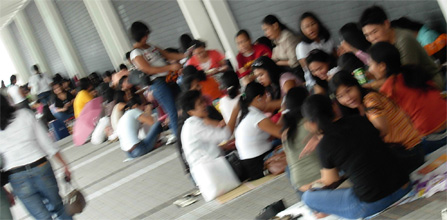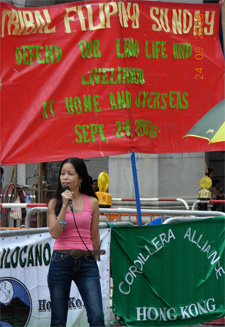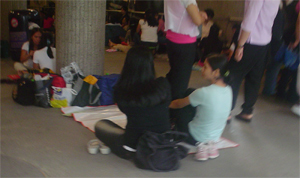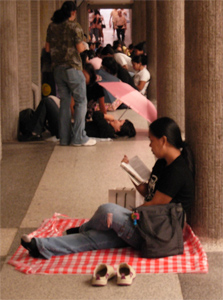TABLE
OF CONTENTS
|
Their Heart Will Go On:Filipinas
in Hong Kong
By Carmina Osuna
There
aren’t enough words to describe the feeling of listening and
experiencing first
hand what I had previously only read and seen on television. Although we had talked about what we would
most likely experience while in port, I never thought it would hit me
so soon after
I embarked in Hong Kong. That
first day my friends and I traveled by ferry to Hong
Kong Island
and
had some lunch before going on a trip to the Stanley Market. There were many Caucasian and Chinese
families in the area and it didn’t take me long to remember how our
discussions
and readings in class depicted the Filipinas in that area, primarily
the domestic
workers. Nicole Constable’s Maid to
Order in Hong Kong, about Filipino domestic workers in Hong
Kong,
describes both the Filipinas who just complain about their situation
and the
others who are actively devoted to making a difference.
On their way to Hong Kong
Island,
Su-lin, Constable’s friend, reveals the predominant negative Chinese
view of
the Filipina domestic worker when she refers to them as “very stupid”
(preface). So after observing many
families in the hopes
of finding a Filipina domestic worker in the midst of them, I realized
that maybe
that day was a family day or maybe they just all happened to be out of
towners
just like myself. Little did I know that
on my way back home I would come across a Human Rights rally organized
by
Filipinos. 
It
just so happened that my first day in Hong Kong,
September
11, was the same day in which the “world commemorated the dark years of
Martial
Law” in the Philippines
(hand out). On my way to the ship that
night I witnessed a Human Rights protest and even managed to get a
flier describing
efforts to fight for the Filipino people’s justice.
The passion with which the man holding the microphone
was speaking was enough to have everyone around, including myself,
standing and
watching him. Although I couldn’t
understand what he or the other Filipino people around him were saying
it felt
pretty powerful.
On
Sunday of that week that I experienced even more than what I had
envisioned to
experience while on Semester At Sea. Upon
exiting the Star Ferry, after traveling from Kowloon
Island to Hong
Kong Island,
I
came across many women sitting in the parts of the terminal sheltered
from the
rain. They seemed extremely out of place
and I wondered if a bomb would drop down any second and I’d find myself
witnessing
a battle between the Filipino women and the police officers. I hoped for the best and quickly began to ask
where Statue Square
was
located and followed the women’s instructions. On
my way there I couldn’t help but notice the rows and
rows of women
sitting on bed sheet-like pieces of cloth taped onto the floor. Each cloth contained anywhere from 1 to 10
people, each group engaged in a different activity. The first few
groups were
eating what looked like rice and chicken. Others
under the
tunnel and around the area were playing
cards, doing
their nails, playing with their children, reading or just
enjoying each
other’s
time. 
When
I made it to the Statue Square
I noticed a Karaoke taking place. After
being in Japan
and experiencing karaoke I was interested to observe them and hear what
they
sang and see how they managed to do it in the rain.
The first Filipino woman I heard cried after
singing “Hopelessly devoted to you”. The
second was a woman by the name of Ms. Berna who sang “All my love for
you”. I heard a couple more love songs
including
“Leaving on a jet plain.” Thinking back
on the songs chosen by myself and other SAS students I began to wonder
if these
love songs could be chosen for a very specific reason.
After hearing a couple more love songs
including “Leaving on a jet plane”, these women were expressing their
feelings
and singing not for themselves but for the loved ones.
During
a brief intermission a man by the name of Mr. Garcia spoke on their “8
years of
longevity”. He also promoted the support
for the companies that “will provide [Filipino people] with what they
needed,”
and those who basically wouldn’t rip them off. I
noticed of the promotional company’s stand. I
wanted to see the advertisement that they
were handing out to the Filipino women and decided to go ask what their
company
was all about. One of the women, Wang,
began to speak to me, in English, about the company called Kcel. Wang spoke about the company’s existence in Japan
and Korea. In Hong Kong Kcel had only been active for 5
months so they “are working hard to promote this company.”
Wang further explained to me that the company
was a type of storage and delivery service in which the Filipino women,
who are
primarily domestic workers (in Hong Kong),
could either
store or ship things to the Philippines. She also went on to show me the different
sizes of boxes and the benefits of purchasing a jumbo or a mega box.
I
then began to ask Wang personal questions about herself. She said that
she was
a domestic worker and that Sunday was the only day off for her and the
rest of
the domestic workers. She went on to say
that they were allowed out from about 7 or 8 in the morning until 9pm. Wang
added that her second job was working with Kcel on
her only day off. I asked her if she
minded or felt overwhelmed
by having two jobs, she replied, “It’s better this way because it’s not
good to
go out.” She told me this while
gesturing and pointing to the mall that was only a few feet away. I then clearly understood that it was better
to keep busy than to have time to  waste the money she
could otherwise
send to
her family back home in the Philippines. She asked if there were any other questions
since she had to go back to work, so I thanked her for her time. Before leaving I met her co-workers and they
gave me a visor and some fliers to take to class. We
all departed with a smile and I felt a
deep sense of appreciation for my own immigrant parents and all of
their hard
work and sacrifice so that I can be what I am today. waste the money she
could otherwise
send to
her family back home in the Philippines. She asked if there were any other questions
since she had to go back to work, so I thanked her for her time. Before leaving I met her co-workers and they
gave me a visor and some fliers to take to class. We
all departed with a smile and I felt a
deep sense of appreciation for my own immigrant parents and all of
their hard
work and sacrifice so that I can be what I am today.
I
had previously not been aware of the Human Rights protest and much less
that
there would be a division between the complainers and the activists
among the
Filipino immigrant workers. After
reading Constable’s article however I began to wonder if the women
sitting
farthest away from the Statue Square
were those who only complained about their situation or if it was just
the
shelter from the rain that chose their locations for them.
The image I had created in my head before I
had arrived in Hong Kong was that just like the
domestic
Worker in the documentary “The Amahs of Hong Kong” (1995), every
Filipina was
an activist in some way shape or form. 
Now
I understand that, whether or not the women are active in migrant
advocacy through
organizations in Hong Kong, the fact that they chose to migrant
countries away
from home in order to work hard to be able to remit half or more of
their
earnings to support their loved ones,
makes them all in a sense
committed
actors engaged in the global economy, trying to improve lives in their
homeland. Through my own interactions
with them I too, like Constable, was impressed by “the strength,
friendliness
and warmth” of the Filipinas.
|



 waste the money she
could otherwise
send to
her family back home in the
waste the money she
could otherwise
send to
her family back home in the 